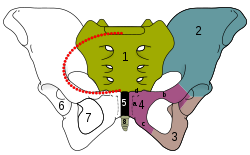The pubic tubercle is a prominent tubercle on the superior ramus of the pubis bone of the pelvis.
| Pubic tubercle | |
|---|---|
 Pubic symphysis exposed by a coronal section. (Pubic tubercle labeled at upper left.) | |
 Pelvis. Pubic tubercle is 4d. | |
| Details | |
| Identifiers | |
| Latin | tuberculum pubicum ossis pubis |
| TA98 | A02.5.01.303 |
| TA2 | 1348 |
| FMA | 16953 |
| Anatomical terms of bone | |
Structure
editThe pubic tubercle is a prominent forward-projecting tubercle on the upper border of the medial portion of the superior ramus of the pubis bone. The inguinal ligament attaches to it.[1] Part of the abdominal external oblique muscle inserts onto it.[1] The inferior epigastric artery passes between the pubic tubercle and the anterior superior iliac spine.[2] The pubic spine is a rough ridge that extends from the pubic tubercle to the upper border of the pubic symphysis.
Clinical significance
editThe pubic tubercle may be palpated.[3] It serves as a landmark for local anaesthetic of the genital branch of the genitofemoral nerve, which lies slightly lateral to the pubic tubercle.[3] This may also be used for the obturator nerve.[4]
Hernias
editThe pubic tubercle is a useful landmark for identifying hernias.[5] An inguinal hernia will lie anteromedial to the pubic tubercle.[5] A femoral hernia will lie inferolateral to the pubic tubercle.[5]
References
editThis article incorporates text in the public domain from page 236 of the 20th edition of Gray's Anatomy (1918)
- ^ a b Jacob, S. (January 1, 2008), Jacob, S. (ed.), "Chapter 4 - Abdomen", Human Anatomy, Churchill Livingstone, pp. 71–123, doi:10.1016/b978-0-443-10373-5.50007-5, ISBN 978-0-443-10373-5, retrieved January 22, 2021
- ^ Garcia-Tsao, Guadalupe (January 1, 2018), Sanyal, Arun J.; Boyer, Thomas D.; Lindor, Keith D.; Terrault, Norah A. (eds.), "15 - Ascites and Hyponatremia", Zakim and Boyer's Hepatology (Seventh Edition), Philadelphia: Elsevier, pp. 220–232.e4, ISBN 978-0-323-37591-7, retrieved January 22, 2021
- ^ a b Narchi, Patrick; Singelyn, François; Paqueron, Xavier (January 1, 2008), Benzon, Honorio T.; Rathmell, James P.; Wu, Christopher L.; Turk, Dennis C. (eds.), "Chapter 49 - Truncal Blocks", Raj's Practical Management of Pain (Fourth Edition), Philadelphia: Mosby, pp. 905–915, ISBN 978-0-323-04184-3, retrieved January 21, 2021
- ^ Candido, Kenneth D.; Benzon, Honorio T. (January 1, 2005), Benzon, Honorio T.; Raja, Srinivasa N.; Molloy, Robert E.; Liu, Spencer S. (eds.), "Chapter 76 - Lumbar Plexus, Femoral, Lateral Femoral Cutaneous, Obturator, Saphenous, and Fascia Iliaca Blocks", Essentials of Pain Medicine and Regional Anesthesia (Second Edition), Philadelphia: Churchill Livingstone, pp. 645–658, ISBN 978-0-443-06651-1, retrieved January 22, 2021
- ^ a b c Jacob, S. (January 1, 2008), Jacob, S. (ed.), "Chapter 6 - Lower limb", Human Anatomy, Churchill Livingstone, pp. 135–179, doi:10.1016/b978-0-443-10373-5.50009-9, ISBN 978-0-443-10373-5, retrieved January 22, 2021
External links
edit- Atlas image: abdo_wall65 at the University of Michigan Health System - "The Coverings of the Inguinal Canal, External & Internal Oblique & Transversus Abdominis Removed"
- pelvis at The Anatomy Lesson by Wesley Norman (Georgetown University) (pelvissuperior2, pelvislateral, pelvisinside)
- Photo at nysora.com
- Photo of dissection at chula.ac.th
- Article and diagram at studentbmj.com